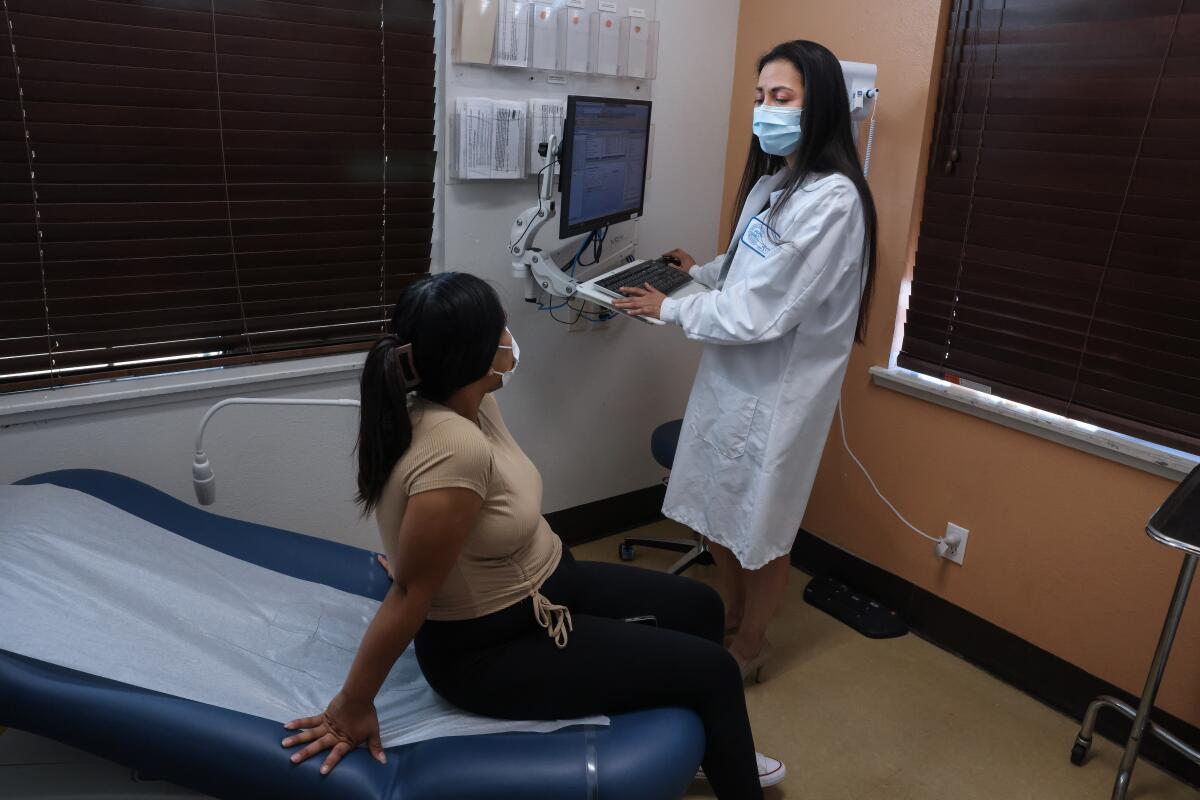Latinx Files: Doctors from Mexico bolster California farmworkers’ healthcare

- Share via
A promising pilot program in the Salinas Valley is bringing much needed healthcare to one of California’s most vulnerable populations.
On Tuesday, The Times published a report by Melissa Gomez (with photographs by Dania Maxwell) about an initiative launched by the Clinica de Salud del Valle de Salinas that brings doctors from Mexico to provide medical care for the area’s farmworkers.
To date, the federally qualified health center has brought to California 24 doctors specializing in several fields, including pediatrics and gynecology. The idea is to bring culturally competent healthcare professionals to a primarily Spanish-speaking community. These doctors are paid a salary comparable with what their U.S. counterparts earn and are vetted by the Medical Board of California.
You’re reading Latinx Files
Fidel Martinez delves into the latest stories that capture the multitudes within the American Latinx community.
You may occasionally receive promotional content from the Los Angeles Times.
By the looks of it, the program has been a success. Dr. Maximiliano Cuevas, chief executive of the Clinica de Salud del Valle de Salinas, says that the doctors are on pace to handle a patient load of 4,500 visits each.
“I keep hearing over and over stories of people who have put off healthcare because they felt that no one was listening, that doctors were making fun of them because they couldn’t speak the language, or doctors were insulting them,” Cuevas told The Times.
Under this program, patients feel heard and understood.
Amazingly, the California state law that makes this initiative possible has been on the books since 2002. However, nothing was ever implemented because the law faced vocal opposition from Latino physicians and the California Medical Assn. Critics accused proponents of wanting to set up a “doctor bracero program.”
It took more than a decade for dissent to die down. In 2015, Cuevas and Arnoldo Torres, previously the executive director of the California Hispanic Health Care Assn., headed to Mexico to begin their recruitment. In 2021, the first wave of doctors arrived.
Consider subscribing to the Los Angeles Times
Your support helps us deliver the news that matters most. Become a subscriber.
The program’s future remains unclear — a peer review by UC San Francisco and the Medical Board of California awaits at the end of the year. Those findings will decide whether it’s extended for three more years.
Regardless of its fate, it’s clear this initiative has been life-changing not just for the patients it serves, but also for the doctors who participate.
“I don’t know if in the future the program will be reviewed positively or negatively,” Dr. Armando Moreno, an OB-GYN, told The Times in Spanish. “But for me, and all of us who see patients every day, to see how their faces light up when you come in and you say, ‘Hi, how are you? How can I help you?’ That, for me, I will carry with me.”
You can read Melissa’s full report here.

Things we read this week that we think you should read
From the Los Angeles Times
Gaza diary: What life is like under daily airstrikes, blackouts and scarcity
A Times special correspondent in Gaza offers a personal account of living in a place where nowhere feels safe.
Biden support down sharply among California voters for first time in presidency, poll shows
A UC Berkeley-L.A. Times poll shows approval of President Biden has dropped among key voter groups. In solidly Democratic California, he still tops Donald Trump.
They throw some of L.A.’s most-talked-about queer parties. What’s their secret?
Who is House of Avalon, and how are they driving new life into Los Angeles’ queer club scene? We spent a night out with them at Precinct, a downtown club, to find out.
SAG-AFTRA committee approves deal with studios to end historic strike
If approved by union members, the tentative contract would end a strike that lasted nearly four months and shut down Hollywood film and TV productions.
From De Los
‘Radical’ opens at No. 5 at the U.S. box office, boosted by major Latino cities
Despite a marketing hurdle, the Mexican film “Radical” reached No. 5 at the U.S. box office, grossing $2.7 million in its first week.
Column: Spanish doesn’t define Latinidad. So what does that mean for Brazilians?
The concept of Latinidad in the U.S. is changing. One byproduct of recent shifts might be more room for Brazilian Americans to have a voice. Guest column by Pedro Moura.
‘De La Calle’ docuseries explores the evolution of Latin music and its connection to hip-hop
“De La Calle,” a new docuseries on Paramount+, explores the depth and evolution of Latin music on a global scale. The series also examines the connection between Latinx people and hip-hop.
Jenna Ortega discusses her Latinx identity in recent Harper’s Bazaar interview
Jenna Ortega says she hopes to be an inspiration for other Latinos, even if she wasn’t raised speaking Spanish.
The Latinx experience chronicled
Get the Latinx Files newsletter for stories that capture the multitudes within our communities.
You may occasionally receive promotional content from the Los Angeles Times.




